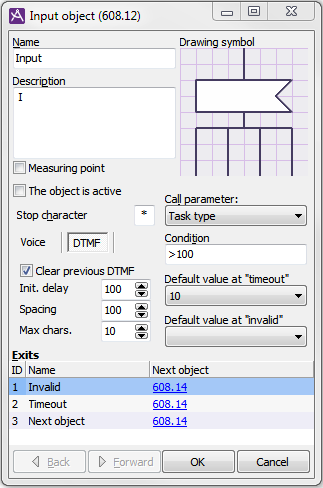When a call in the flow reaches an input object, ACE ServiceNode Tenant signals to the relevant IVR that it is time to play the phrases preceding the next object, and then wait for an entry. So, the flow stops at an input object, waiting for some kind of interaction from the caller. It can either be a DTMF entry or a voice recording.
An input object halts the flow and waits for some interaction from the caller. The input is the stored in a call parameter for later retrieval. The input can be either a sequence of digits entered as DTMF characters, or a voice recording.

In addition to the general properties there are the following, input object specific properties:
- Stop character
- The DTMF character that the caller can enter to signal that the input is complete. A commonly used stop character is the hash sign, #.
- Call parameter
- The call parameter where the result of the input will be stored. A recorded file (see Voice is temporarily stored in the IVR with the same name as the selected parameter.
- Voice
- When selected, the IVR will record the voice input from the caller, and the following options are available:
- Rec. time
- The maximum number of seconds to record.
- Phrase distribution
- Determines how the recorded phrase is distributed:
- Direct will distribute the recording immediately after it is completed.
- Ordered will not automatically distribute the phrase, but let an administrator review the recording before the phrase is used.
- DTMF
- When selected, the IVR will accept DTMF characters as input, and the following options are available:
- Clear previous DTMF
- If ticked, the DTMF buffer is initially cleared from any previous input. Untick if you want to allow the caller to skip phrases and start entering from earlier menues, without waiting for the system. However, this is not recommended, as wrong entries can result in unwanted effects.
- Init. delay
- The number of seconds to allow before the first DTMF character must be entered.
- Spacing
- The number of seconds to allow between each separate DTMF character.
- Max chars.
- The maximum number of allowed characters.
- Condition
- An optional condition for validating the given input. If the condition is not met, the call will continue executing on the Invalid exit.
For example, the condition >100 will allow an entry of e.g. 123, but an entry of e.g. 42 will be regarded as invalid.
- Default value at "timeout"
- The value to use if input is
timed out
-- i.e. not completed within the set time limits -- and the call is continued executing on the Timeout exit.The available values in the dropdown depend on the selected call parameter. E.g. if the selected call parameter is Task type, the values available here are the configured task types.
- Default value at "invalid"
- Similarly to the Default value at "timeout" above, this value is used if the input is regarded invalid and the call is continued executing on the Invalid exit.